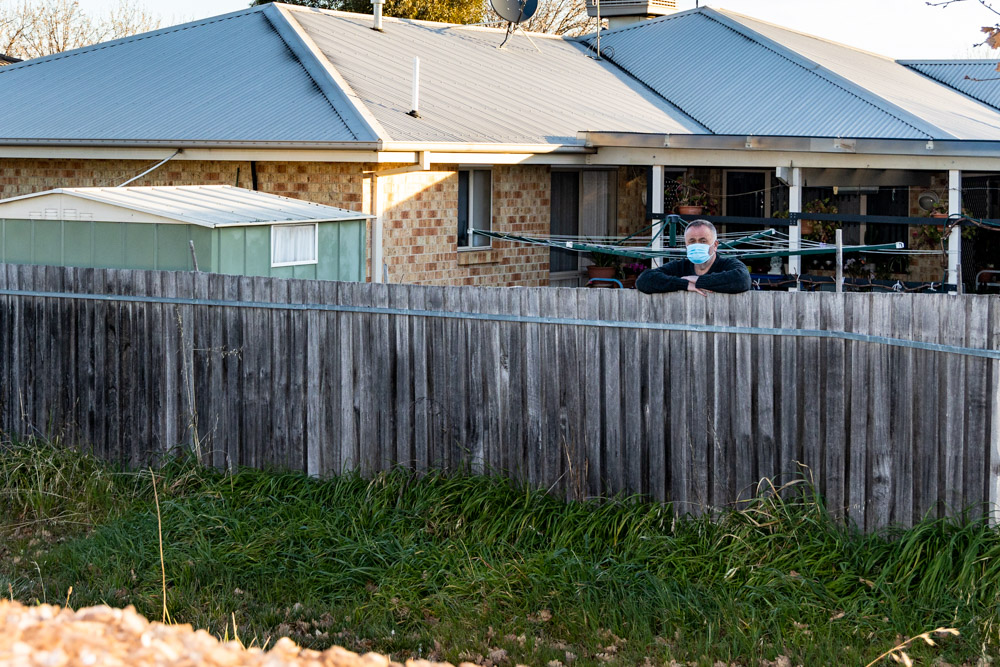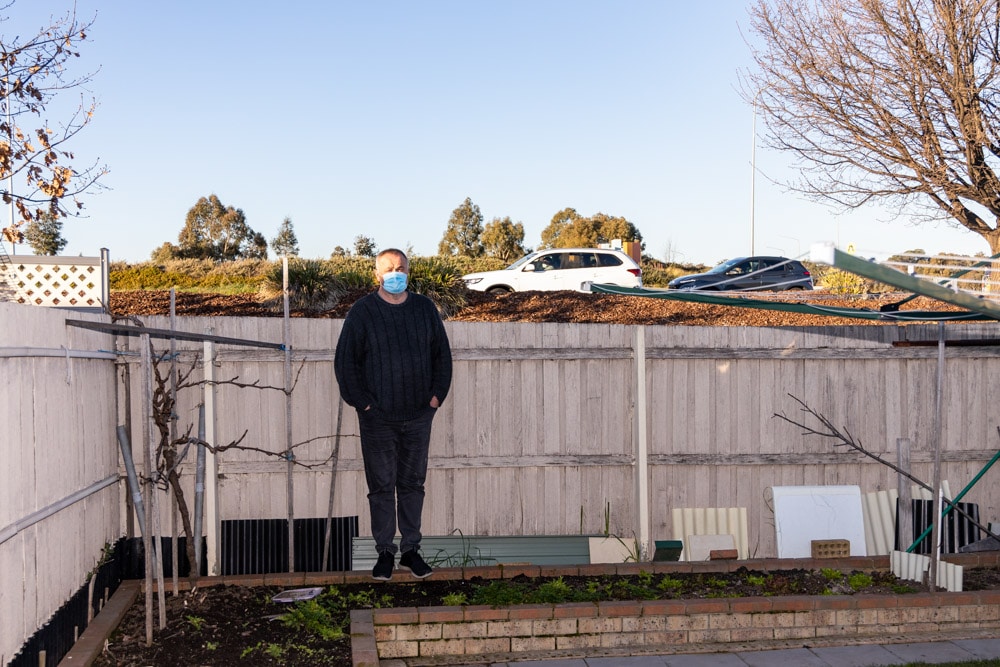It is early afternoon on a Thursday, and I am sitting in the garden of Gungahlin resident Zeljko Pekic. With its neat flowerbeds and grapevine trellis, the garden would be tranquil – were it not for the traffic.
Horse Park Drive is 20 metres from the back fence, and higher than the garden. A steady stream of traffic roars by, and the garden smells of petrol fumes. Within the space of a minute, I count half-a-dozen cars and another six trucks, one pulling up to the traffic lights with a screech of compression brakes. And this, Mr Pekic says, is ‘mild’.
Six months ago, Mr Pekic told Canberra Daily that constant traffic noise was driving him to despair. Now, he said, the problem is getting worse – and he believes the ACT Government does not heed his concerns.
He is not alone; Gungahlin residents say traffic noise makes them “angry and distressed”, and some consider leaving the area.
Garden is unusable – but government says noise levels are acceptable
From 6am to 4pm, Mr Pekic says, construction vehicles go up and down the Drive, en route to build a school or new houses; trucks deliver to supermarkets in the morning; police cars and ambulances, sirens blaring, head to and from Bonner.
“You can’t open the doors and windows during the day; the road noise is there,” Mr Pekic said. “You can’t open the doors and windows at night, because we’ve still got road noise.”
His neighbours cannot use pergolas or outdoor areas they have built, he said, so bad is the noise.
Mr Pekic is desperate for the ACT Government to put up noise mitigation barriers, “for the residents here and for our own sanity”. One was built a few years ago in his street, but it stops just short of his property. His block is exposed to the road; there are no trees, no shrubbery, to block out the sound.
A government survey last year, however, determined the noise was within an acceptable range.
“But the extreme noise levels are constant; it doesn’t stop,” Mr Pekic said.
And he expects it to worsen as more new suburbs are constructed, traffic increases, and peak hours lengthen.
He has asked Chris Steel, ACT Minister for Transport and City Services, or someone from Transport and City Services (TCCS) to come out and see the problem themselves – but has had no luck.
Mr Pekic believes living near the main road is taking its toll; he points to reports from Europe and North America that state that road noise can be physically and psychologically harmful.
Every year, 200 to 500 Danes die prematurely due to traffic noise. Road traffic noise affects health and wellbeing, states the World Health Organization (WHO). Noisy roads might affect sleep quality and cardiovascular health, according to Australia’s own Department of Health. Living near a major road is linked to neurological disorders, including dementia, Parkinson’s, Alzheimer’s, and multiple sclerosis, according to a Canadian report in Environmental Health.
Mr Pekic himself has had bronchitis three times since moving to the Gungahlin house – and he never had it before.
“If the liveability of your home is sacrificed, people go mad,” Mr Pekic said. “But the ACT Government just doesn’t care; they say this is within acceptable levels.”

Noise is ‘unbearable’, and Gungahlin residents are ‘angry and distressed’
Mr Pekic is not the only one afflicted. Many other Gungahlin residents – living near Horse Park Drive, Mulligans Flat Road, Gundaroo Drive, Well Station Drive, Gozzard Street, and Anthony Rolfe Avenue – have complained about the incessant noise from earth-moving trucks and other loud vehicles.
Leanne Castley, local Liberal MLA, said some had “quit the area”, while others were “barricaded in their homes over summer with doors and windows shut to reduce the noise”.
“We are cooped up inside with our doors and windows closed, because we have large trucks hauling excavation materials rumbling past with around 45-second frequency,” one local wrote to Ms Castley.
“It is truly unbearable. All our neighbours are exasperated as well. There are lots of angry and distressed people out here in Gungahlin.”
Some are so fed up they want to move; others have already, according to Ms Castley.
While Horse Park Drive is a main road and some noise was to be expected, there was heavy traffic at unusual times of the day, she said; Gungahlin residents complained that trucks drove on public holidays, early mornings, and late into the evening.
Leaf blowers disturbed the neighbourhood at 5am, Mr Pekic said. There are complaints, too, of anti-social ‘hoons’ doing burnouts at Mulligans Flat, then blasting down into Amaroo, Ms Castley said; a man in Forde recorded 13 cars revving, going hell for leather, as they turned through traffic lights by his house.
Traffic noise was “an ongoing problem for Gungahlin,” Ms Castley said. “There’s got to be ways that the government can step in and help here. If a minister lived here, I’m pretty sure something would get done – but there are no ministers in Gungahlin. People feel like no-one cares. It’s just Gungahlin, it’s just the fastest-growing suburb area in Canberra, but never mind, we’ll leave them to their own devices, almost. It’s pretty disappointing for the Yerrabi people.”
For some time, TCCS had engaged with residents who live near Horse Park Drive to explore noise issues and potential mediations, a government spokesperson said.
Construction was “great” for the area, Ms Castley thought – “We’re not trying to make a mess of the trucks and the trailers and the building out there” – but the government needed to make sure the noise did not affect residents.
She has urged Chris Steel to reform the Noise Environment Protection Policy, which sets the ACT’s noise limits.
“No-one should have to put up with this constant noise, and the Minister must review noise control and time restrictions for large construction vehicles,” she said.
She suggested that the government could build more sound barriers, or consider changing times trucks could travel on the road; and that the police could inspect hoon behaviour and why trucks worked on public holidays.
“There’s all sorts of options that the government could consider, but they refuse to believe there’s a problem,” Ms Castley said. “Why is the government unwilling to come and chat with these people, and listen and see what they can do?”
Minister Steel urged to see for himself
The government response, Mr Pekic says, is “Zero. They don’t want to know about it.”
In May, after Mr Pekic raised the issue, the government installed noise-monitoring equipment at two properties in his street over a one-week period. The surveys determined the noise was below the threshold set in the government’s Noise Guidelines.
But Mr Pekic believes the report told the government what they wanted to hear. “It was done in the best possible circumstances for them.” The report showed day and night averages, rather than peak decibel levels, he argues, and the equipment recorded for 15 days, but the report only used nine days.
Mr Pekic has emailed TCCS for further information, but says they do not reply.
“It’s like they’ve tried to bury their heads in the sand, and hope the whole thing goes away.”
He wants Mr Steel to stand in his garden, and see the problem for himself, rather than rely on a report. Ms Castley has also asked the minister to visit Mr Pekic’s house, as she has done.
“TCCS won’t do it, the minister won’t do it,” Mr Pekic said. “If one of them lived here, you would see action straightaway. But because it’s such a minor inconvenience for 30 houses in Buckingham Street, it’s not a major vote-earner to do anything about it.
“Chris Steel, come out here; why won’t you come out? TCCS, come out here; why won’t you come out? We’ve asked them that. Nobody cares.”
Ms Castley said she was “a bit flabbergasted that the government seemed uninterested,” and “happy to fob it off as just road noise”. The noise in Mr Pekic’s garden was “oppressive,” she thought.
“It would be terrible to live with that constant traffic noise. … I would challenge the minister to see if he would find it acceptable to live there.”
Ms Castley said she would keep pressing Mr Steel to come, and has put through a Freedom of Information request for the full report.
“It’s very easy for people in government to go ‘Oh, well, we put some sound things out there, and it didn’t register as high, so there’s nothing to see here’. That’s not a good excuse anymore. These are real people; these are real lives.”
If ACT residents are concerned about road noise, they should contact TCCS through the Fix my Street form, a spokesperson said. Noise from vehicles being driven on public roads is exempt under the Environment Protection Regulation 2005.
Canberra Daily would love to hear from you about a story idea in the Canberra and surrounding region. Click here to submit a news tip.



